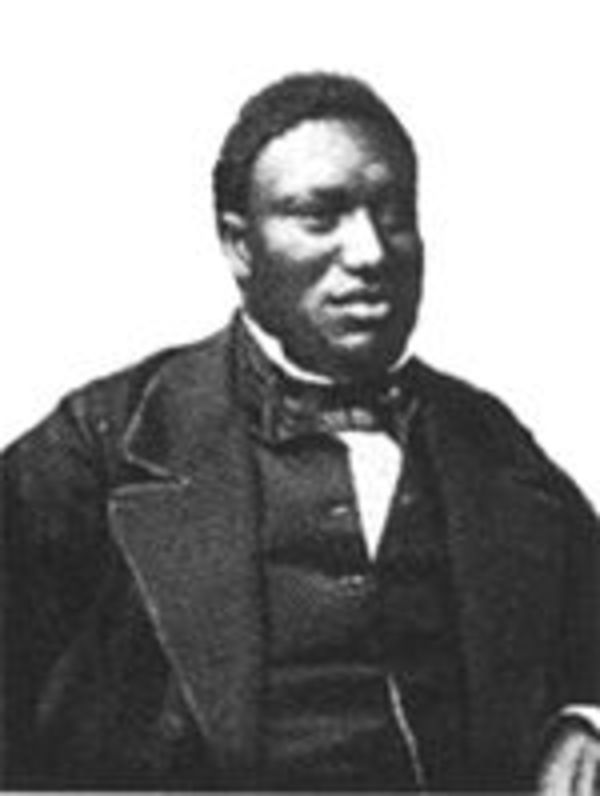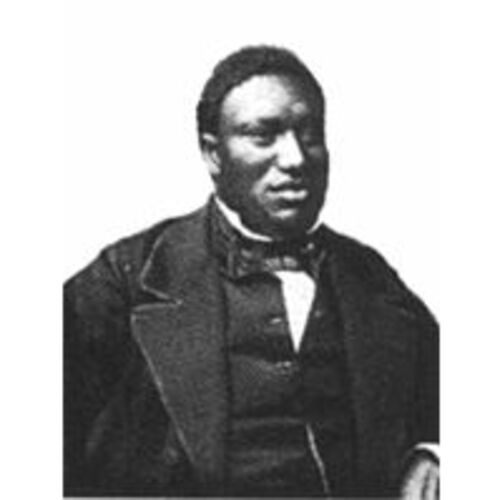
Source: Link
WARD, SAMUEL RINGGOLD, abolitionist, journalist, and lecturer; b. 17 Oct. 1817 in Maryland, son of slave parents, Anne (Harper?) and William Ward; d. probably in 1866 in Jamaica.
Samuel Ringgold Ward’s parents escaped to Greenwich, N.J., in 1820 and in 1826 moved to New York, where Samuel was educated by Quakers and became a teacher in Black schools. In January 1838 he married a Miss Reynolds while he was teaching in Newark, N.J.; they were to have one son. Ward was licensed to preach in May 1839 by the New York Congregational (General) Association, and he held two white pastorates in New York State from 1841 to 1851. Between the two ministries, in 1843–46, he studied medicine and law. He had already come to the attention of Lewis Tappan, a leading New York abolitionist, and had been appointed an agent of the American Anti-Slavery Society in 1839. He had joined the Liberty party and in 1844 set out on his first lecture tour to abolition, temperance, and peace societies. From 1845 to 1848 Ward edited the True American and Religious Examiner in Cortlandville Township, N.Y., and in 1849 he went to Syracuse, N.Y., to edit the Impartial Citizen, which he took to Boston in 1850. In October 1851 he was active in aiding the escape of William Henry, a principal in the “Jerry” fugitive slave rescue case. To avoid arrest, Ward fled to Toronto.
Ward quickly attracted the attention of the new Anti-Slavery Society of Canada and was appointed to the executive committee late in 1851. The following year, acting upon the suggestion of American abolitionist Samuel J. May Jr, the president of the society, Michael Willis*, sent Ward on a speaking tour of Canada West, during which Ward organized (with the help of the secretary of the society, Thomas Henning) branches in Grey County, Hamilton, Kingston, and Windsor. In April 1853 the society sent Ward to England to seek funds to help the fugitive slaves then pouring into Canada West, and within ten months he was able to raise £1,200. Ward remained in Britain addressing the 1853 and 1854 meetings of the British and Foreign Anti-Slavery Society, writing his Autobiography of a fugitive Negro, and inspiring Mary Jane Kinnaird, wife of an Anglican philanthropist, to found a mission school for the free Black population of Canada.
According to Ward, an English Quaker friend, John Candler, offered him 50 acres of land in Jamaica, and Ward left for Kingston late in 1855 with his son to relieve his family “from a position of dependence.” He also apparently left without paying debts to a London tradesman and to the Canadian Anti-Slavery Society. At first Ward served as pastor and political adviser to a group of Baptists in Kingston, but in 1860 he moved onto his land, wanting to “hasten back to what my father first taught me . . . the tilling of the soil. . . .” He published in 1866 a vigorous defence of the Jamaican governor’s suppression of the rebellion which broke out at Morant Bay in October 1865. Ward’s defence of the savage reprisals against the rebels shows him to have been fully on the side of the government, although he did comment on the tendency of whites to stigmatize all Black people for the acts of a few. In 1866, or soon after, he died, apparently in poverty.
Ward was and is an enigma. A militant Black man well ahead of his fellow fugitives in his awareness of the necessity to win the full respect of the Canadian communities into which they moved, he was opposed to all self-segregated, utopian Black settlements such as William King*’s Elgin settlement. He argued against the “begging system” prevalent in Canada West in the 1850s, by which roving Black ministers sought funds and clothing for the fugitives, and yet himself undertook a begging mission to Britain. He was nominally editor and part-proprietor of the militant Provincial Freeman, a fugitive newspaper founded in Windsor in 1853 and under the real editorship of Mary Ann Shadd* who, with Ward, was the most outspoken Black voice for the fugitive slaves in Canada. He insisted that Black people arriving in Canada must speak with one voice in demanding their rights which, he concluded, were as little respected here as in the United States. Yet he was unpopular with many of the escaped slaves, clashing with Henry Bibb* of the rival Voice of the Fugitive and with the Refugee Home Society; and although he was regarded as an exceptionally fair and articulate lecturer, he directed his “belligerent spirit” against the officers of the British and Foreign Anti-Slavery Society, who found him to be an immediatist on the slavery issue. His superb presence on the platform (he was ranked next to Frederick Douglass as a speaker) placed him ahead of most white orators of the time. Ward nonetheless bowed to those he regarded as his British superiors and obviously enjoyed the company of the great. He also concluded that only the spread of Christianity and British civilization would lift Africa and Black people in general from their lowly status.
Contradictions aside, Ward was clear on the basic issue of the time: that slavery and racism, although related, were different, and that while slavery must be ended, and at once, the long battle against racism would stretch far into the future. In concluding that the Canadian abolitionists were too mild in their vision of that future, and too patronizing to the fugitives, Ward stood ahead of his time.
[S. R. Ward is an elusive figure, and even his Autobiography of a fugitive Negro: his anti-slavery labours in the United States, Canada, & England (London, 1855; repr. New York, 1968; repr. Chicago, 1970) does not reveal much. The only known copy, possibly a reprint, of his Reflections upon the Gordon rebellion (1866) may be found at the University of Michigan (Ann Arbor), Dept. of Rare Books and Special Coll. The Provincial Freeman (Windsor; Toronto; Chatham), 1853–56, the Liberator (Boston), 1831–65, the Voice of the Fugitive (Sandwich; Windsor, [Ont.]), 1851–53, and the Frederick Douglass’ Paper (Boston), 1847–63, make frequent reference to Ward; the Anti-Slavery Reporter (London), 1853–55, provides accounts of Ward’s visit to England. Issues of the Impartial Citizen (Syracuse, N.Y.; Boston) for February 1849-June 1850 and September-December 1850 are held by the American Antiquarian Soc., Worcester, Mass. The Anti-Slavery Soc., anti-slavery papers, 1820–1951 (mss Brit. Emp. s.16–24), at the Rhodes House Library, University of Oxford, contain many references to Ward between 1853 and 1855, as does the Anti-Slavery Soc. of Can., Annual report (Toronto), for 1852–57. r.w.w.]
Autographs for freedom, [ed. Julia Griffiths] (Boston, 1853). DAB. The antislavery vanguard: new essays on the abolitionists, ed. M. B. Duberman (Princeton, N.J., 1965). B. [L.] Fladeland, Men & brothers: Anglo-American antislavery cooperation (Urbana, Ill., 1972). Winks, Blacks in Can. R. K. Burke, “The Impartial Citizen of Samuel Ringgold Ward,” Journalism Quarterly (Minneapolis, Minn.), [49] (1972), 759–60.
Cite This Article
Robin W. Winks, “WARD, SAMUEL RINGGOLD,” in Dictionary of Canadian Biography, vol. 9, University of Toronto/Université Laval, 2003–, accessed December 25, 2025, https://www.biographi.ca/en/bio/ward_samuel_ringgold_9E.html.
The citation above shows the format for footnotes and endnotes according to the Chicago manual of style (16th edition). Information to be used in other citation formats:
| Permalink: | https://www.biographi.ca/en/bio/ward_samuel_ringgold_9E.html |
| Author of Article: | Robin W. Winks |
| Title of Article: | WARD, SAMUEL RINGGOLD |
| Publication Name: | Dictionary of Canadian Biography, vol. 9 |
| Publisher: | University of Toronto/Université Laval |
| Year of publication: | 1976 |
| Year of revision: | 2025 |
| Access Date: | December 25, 2025 |



